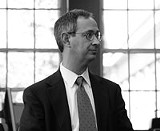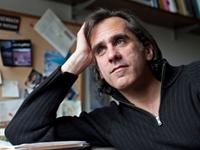[
{
"name": "500x250 Ad",
"insertPoint": "5",
"component": "15667920",
"parentWrapperClass": "",
"requiredCountToDisplay": "1"
}
]
The future of Rochester's economy will be increasingly linked to health care and education, says Joel Seligman, the University of Rochester's new president. And his goal --- to take the university from being a "good institution" to being one of the most prominent educational centers in the country --- could impact the region's economy.
"I really love this city," says Seligman. "Rochester is a great place to live. But it is undergoing a difficult transition from an old economy to a new economy. The companies of the future probably won't employ as many people as those of the past, but there will be more of them."
Statements like these make it clear that Seligman understands just how important the UR is to the area. With more than 16,000 people on its payroll, it has surpassed Kodak to become Rochester's largest employer. And that makes Seligman one of the area's most influential community leaders.
With an undergraduate and graduate enrollment of more than 8,000, the university consists of six schools --- the Eastman School of Music, the School of Medicine and Dentistry, and the Simon Graduate School of Business the best known. The university also oversees the Memorial Art Gallery, a laser research lab, and the University of Rochester Medical Center, which includes Strong Memorial and Highland Hospitals.
Seligman is a political science graduate of UCLA, earned his law degree at Harvard, and has taught law at NortheasternUniversity, GeorgeWashingtonUniversity, and the University of Michigan. Most recently, he was dean of Washington University's law school, where he was credited with dramatically improving the school's national standing. The author of more than 20 books, he is considered an expert in the area of securities law.
Seligman became the UR's 10th president on July 1, and within days of taking office, he launched the most ambitious capital-endowment program in the university's 155-year history. In a recent interview, Seligman talked about his new position and his vision for the university. Following is an edited transcript of that conversation.
City:What charge has your board given you? What do they want you to do?
Seligman: There were five dominant themes to focus on: fundraising, communications, senior leadership selection and retention [deans, for example], our relationship to the community, and diversity. Translating this, it means that I see a need to develop new strategic plans for the university.
City: You've brought James Thompson in from WashingtonUniversity to lead the fundraising effort. What will the money do?
Seligman: The key to taking a very good university and making it a great university is strategic planning. And the purpose of the planning is to focus. Starting with where the schools are now, how do we make them stronger? With the medical center, in some instances it will be: how do we attract and retain the best faculty and researchers? It might be: how do we offer inter-disciplinary programs? It might mean expanding: what areas of research do we want to go into?
In some instances, it may mean more support for students. Each school will be different. Capital campaigns don't begin with asking for money. Capital campaigns begin with articulating why the alumni should be proud to support the school. And that's why strategic planning is so critical.
City: What makes a college or university excellent? Can you create an excellent university?
Seligman: It's not one thing. You first want great faculty in terms of teaching and research, and I have come to believe there is not a conflict between teaching and research. Great scholars tend to be great teachers. You want a school that students want to attend as their first choice. You want a school that is still small enough where students accurately feel that their voices count.
I take very seriously community service. You want a school that not only recognizes its academic role, but that it cannot be remote and separate from the urban area where it is located.
You want a school, when it has medical center, to have a hospital that is probably focusing on the most important forms of medicine that can be taught to students. To be very specific, one of the things I found quite attractive was the regional strategy with respect to the hospitals. It has become a truly significant set of hospitals, not only to the immediate Rochester community, but to this broader region. So this gave me confidence that we could attract the best faculty and students.
So the answer is yes, you can create an excellent educational center.
City:How much of a university's reputation is PR, and how important is it to, in marketing terms, "brand" the university?
Seligman: It's very, very different than marketing a product on Madison Avenue for, let's say, Procter & Gamble. This is a university where an enormous number of faculty and alumni are immensely proud of the accomplishments they achieved here. We want to effectively communicate those accomplishments and what they mean in terms of our identity.
The term "branding" would not have been my first choice. But the fact is, we are one university. Whether you're in the Eastman School of Music or the SimonSchool or the MedialCenter, it doesn't matter. We don't want to lose that sense of collective identity, because it has a special value.
City: Going back a few years, Strong had gained a solid reputation as a cardiac care center. But more recently, we hear more about the research work being done. How are you positioning the hospitals?
Seligman: We're clearly a very effective hospital network in the city of Rochester. And it's terribly important to the community that we continue to be so.
A medical center is a complex entity. It is not purely about clinical delivery, nor a school, nor a research facility. It is all of the above and more. And one of the things that the university does exceptionally well, to our advantage, is the integration of all of these parts.
We've learned that when we have strong patient care in our clinical enterprise, we offer a better education and a better basis for our research. And I think you will see us continue to grow in this capacity. Again, this goes back to strategic planning, and then the question becomes one of being a vital regional health-care center. Or will we become increasingly more relevant to the national and world communities?
City: There was a period when the university seemed to be scaling back on some of its humanities programs and ramping up on other programs. For example, there seemed to be a growing emphasis on the schools that serve the new economy, such as the SimonSchool and the School of Nursing.
Seligman: You know, in a certain way we have tried very hard to offer students a liberal education, to create more well-rounded individuals, whether they are in the medical school, the business school, the education school, or the music school. We have at the undergraduate level what we call "cluster areas," and the notion here is that a well-rounded person should not be focused on just one subject, but will need and should be exposed to a wider range of interrelated subjects and intellectual areas.
We are unique in what we call our "Take Five Program," where we will pay for a person to continue to take classes here for a fifth year, as long as he or she studies something different than what they studied in the first four years. It's a unique commitment to the integrity to our educational process.
I am firmly convinced that you cannot have a truly great university without equally great humanities, without great arts and social sciences, without great engineering. I am absolutely convinced of it. There may be some movement, some growth in the university over time. But I don't want to try to build up one segment of the university at the expense of another.
I came in and said something that may have startled some people here, but I absolutely meant it: I don't intend to cut academic programs in aggregate here. Does that mean that a department that currently consists of 11 people will always consist of 11 people for ever and ever? No. The schools may decide they want some growth here and less there, but it does mean that I am not going to the schools and insist upon cuts. I will not do that.
City: You're the new guy, and we know so little about you. What do you want people in Rochester to know about you at the most parochial level?
Seligman: Well, first I want them to know I love Rochester. It's a wonderful place. I mean that. Everyone has been so enthusiastic and receptive. But at one level, what I want more than anything else is to help build a university which is inclusive. A place where people regardless of race, gender, religious affiliation, political philosophies are comfortable and can come together to have serious discussions on the type of academic issues that lead to a robust academic community.
It is terribly important to me that the university itself not have a political point of view, that it be an institution that provides a forum where all serious points of view are welcome. I am, like Tom Jackson [Seligman's predecessor], a novelty at the University of Rochester. We're the only two former law professors on the faculty. And I think it's the case that when the law operates best, it takes seriously opposing ideas, tries to consider the evidence, tries to hear facts before reaching conclusions.
City: Rochester has always thought of itself as a white-collar town. Now it finds itself dealing with large layoffs. I don't think 25 years ago anyone would have guessed the UR would become the area's largest employer. That creates an extra set of responsibilities for you. What do you want the area's politicians to know about your plans?
Seligman: I had looked at the employment picture before coming here, and I could see the trend lines. The reality is, over time probably two of the most important areas of economic activity will be college and university education and health-care delivery. I am not speaking about just the university and the medical center, though we may increase some. But this is a thriving community for higher education.
My sense from meeting with Dr. Al Simone at RIT and from meeting with presidents at the other fine colleges is that there is a really strong sense of optimism on the educational side. With respect to the medical center: this is a thriving institution, and as the regional strategy further takes hold we will see more and more patients coming here for what we hope will be really outstanding care.
What I would like to see is the fortification of two types of relationships that the University of Rochester has to the city and the community more broadly. First, in terms of economic generation, I think we can do a better job in inspiring and helping start-up businesses. I just finished meeting with our scientists, and I was struck by the amount of energy and degree of interest we have here. There is so much they would like to do, so many things they would like to develop.
Next, we have a social role, whether it is as a major employer or as an educational center. I can't give you the precise number of programs that the university is involved with in partnership with the city, but I think it is well over 300. It ranges from dental care, to the WilsonMagnet school, to community and preventive health, to urban fellows --- just on and on. Many of our students feel this is an important part of their education, and many of our faculty feel this is an important part of their research. That's going to be strengthened over time.
City: As you looked at Rochester, what in your estimation are the biggest problems facing the city?
Seligman: I think in a broad historical sense that the city is gravitating from a period when it was dominated by manufacturing such as Kodak, Xerox, and Bausch & Lomb to a period when a new economy is emerging. Some of it will be quite entrepreneurial, like Paychex. My sense is that they will be quite scientific and knowledge-sensitive industries. A few may be spin-offs of the university.
If you look at the city, one can see that the downtown area has gone through a 20 to 30-year decline and an eroding tax base. There are problems with the city school district. And as a lawyer, I understand the concerns with lead-based paint and how it is impacting our children. But at the core of it, if you had to put your finger on it, it's the economic base. It just isn't as robust as it was a few decades ago. That's perhaps the biggest problem, and we must find ways to reignite the economic engine for this region.
At another level, it's to provide the infrastructure so that more people will want to come here and stay here or, as the economic picture begins to pick up, that people don't want to relocate. I think the single most concerning thing I have learned about Rochester is the high number of young people who, once they have graduated, leave. We want to create a city that is so vibrant that they call it home, and they want to live here. And that the job opportunities are here, so they can make that choice.
City: Do you see the university expanding? Will you be adding a school? Might we see a law school sometime in the future?
Seligman: Let me come back to that in the future. We have just begun the planning process, and the challenge to the deans is: everything's on the table. But I want to give you a serious answer at a later time.
I am aware that the University of Rochester's MedicalCenter is, among Tier 1 research centers, relatively small. Does that mean that we automatically expand? No, not necessarily. But it does mean we need to understand why the others are larger. And from there, what do we think is feasible?
City: If you were meeting President Bush this afternoon, what would you want to talk to him about?
Seligman: I suppose more than anything else, I would want to talk about the urgent need to fortify social programs, and about my great concern that the terrible calamities of Hurricane Katrina and the enormous burdens we are carrying because of the war in Iraq won't lead to a further reduction in social programs, which I think are vital. And I say that not just because they are supporting people who are suffering, but because these programs are vital to our long-term economic health.
City: What other world figure would you like to meet?
Seligman: Living or dead?
City: Dealer's choice.
Seligman (pointing to a bust of Abraham Lincoln): Not just because of what the man faced. He was a principled man. And he was concerned for the well-being of all people.
Speaking of University Of Rochester, Rochester Economy
Latest in News
More by Tim Louis Macaluso
-

RCSD financial crisis builds
Sep 23, 2019 -

RCSD facing spending concerns
Sep 20, 2019 -

Education forum tomorrow night for downtown residents
Sep 17, 2019 - More »









